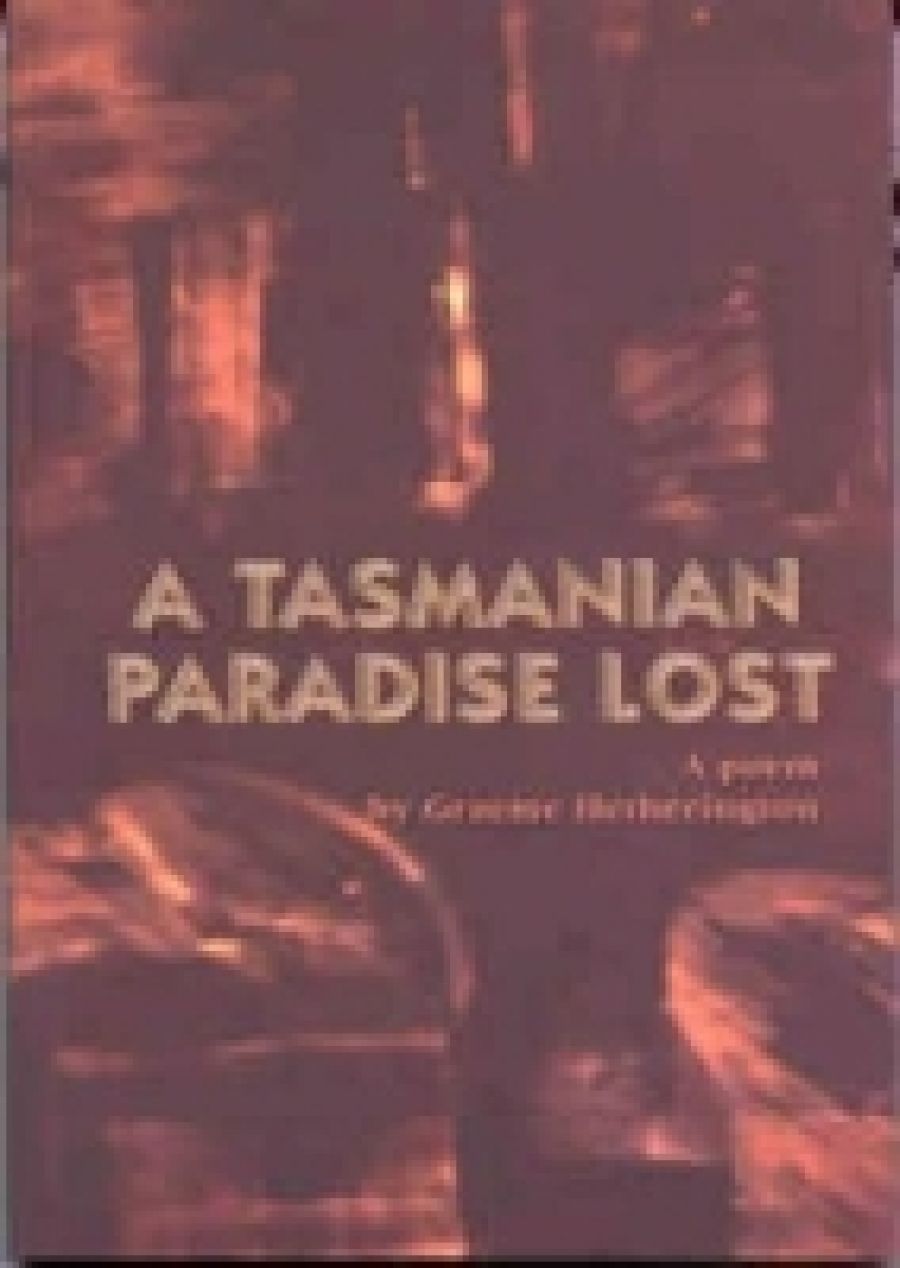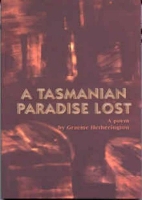
- Free Article: No
- Contents Category: Poems
- Review Article: Yes
- Article Title: Lost Edens
- Online Only: No
- Custom Highlight Text:
In the first part of his new collection, Graeme Hetherington returns to the cultural territory he presented, differently registered, in In the Shadow of Van Diemen’s Land (1999). This is the west coast of Tasmania, reconstructed this time, in ‘West Coast Garden of Eden’, as the provocative place of his childhood, an Eden after the Fall in which innocence has long before succumbed to temptation. The twenty-seven parts of ‘For Boyd’ present Boyd as the narrator’s schoolmate, a son of working-class parents who has Paul Newman looks, a careless disregard for all forms of authority, an impressive and precocious sexual appetite, and a rebel’s capacity for mischief.
- Book 1 Title: A Tasmanian Paradise Lost
- Book 1 Biblio: Walleah Press, $15 pb, 92 pp
- Book 1 Cover Small (400 x 600):

- Book 1 Cover (800 x 1200):

- Book 2 Title: Other Gravities
- Book 2 Biblio: Sunline Press, $25 hb, 108 pp
Boyd is no displaced Adam wary of the Law of the Father. Rather, as the misfit schoolboy stuck in the fifth grade, he is old Clarky’s ‘Caliban’ with a succession of Mirandas and energy enough to populate the isle with Calibans. But, as usual in such writings, interest shifts between the protagonist and his reporter/creator. Although Boyd, drawing his younger mate with him, might lead the way in drinking, rebelliousness and sexual experience, the narrator does more than ‘keep nit’ over liaisons with Marg Kerr, Tessy Dawn or this or that shift-worker’s wife. Together, they test boundaries in ways that recall, in their particularities, the nostalgic stuff of boyhood experience.
Hetherington’s portrait of the mining, timber-cutting community is a sceptic’s recollection. The narrator moves between the middle-class (managerial) perspectives of his own family and the more vital attractions of Boyd’s world, in which ‘Mummy Dot’, the woman so roundly disparaged by his own mother, is his ‘first madonna’ and the boys go possuming, shoot rainbow trout with .22’s and rampage in the bush. In this comedy of manners, community activities have an emotional charge. Against the backdrop of work patterns, social codes and markers of change, idiosyncratic behaviour serves to test ideas of normality; and the excitements of adolescent experience are presented in rich, quirky detail.
The second part of the collection, ‘Life in the European Wilderness’, chronicles a querulous traveller’s passage through brilliant markers of civilisation and decay. Armed with literature, imagination, sexual appetite, an abundance of ghosts and an ageing flâneur’s interest, he presents a sordid present underwritten by the classical past. Layers of history emerge everywhere, even as rats, cockroaches, stray cats, dirt, the ubiquitous street prostitutes and a wondrously dyspeptic Dr K write over that inheritance. Here, the references are to Greece, Crete, Spain, Czechoslavakia and England, but always, as well, to Tasmania, particularly to Van Diemen’s Land grotesqueries and Hetherington’s ambivalent claims upon his Hell’s Gates origins. Typically, the referential field is complex and ambiguous, carrying the weight of oppositions that come not only from interplays of past and present but also from an interestingly divided sensibility. Introduced as an ‘unhorsed Don Quixote type / Fired by the city’s female name’, the narrator of ‘Thessalonika (2)’ offers a palimpsestic view of things that applies to so much of this poetry. Place is always crossed by time, and there is any number of possible narratives, or perspectives:
The city’s like a ruined whore,
Since everyone since kingdom come,
From Roman, Visigoth and Frank,
To Bulgar, Arab, Turk and Hun,
Queued up to enter, have their bit
Of fun and leave without a qualm
For slowly causing, with the help
Of natural earthquakes, dead-end, cunt-
Dark bandy-legged streets, pert church
Domes to be knocked skew-whiff, and walls
To hang like badly broken arms
Around her vulnerable remains.
This wry comic sense applies, as well, to a low-rent appreciation of Athens in her history, where the great dramatic heritage and the architecture contend with vulgarities of street life, and to the Miss Havisham of Kolonaki Square, ‘some actress’ with her white Marcel Marceau face, scabs, drama queen’s patter and a story about Cavafy. Interspersing them with his plays upon classical and romantic figures of art, artists, creativity and suffering, Hetherington offers vivid images of place such as this from ‘Hania, Crete’:
All afternoon I sit and watch
Trees drinking up the failing light,
The rust-red bougainvillea shoot
Like flame from earth and lick a roof
Just painted white before night swamps,
Greek widows poking sticks at male
Peacocks displaying brilliant tails Until
they scream and sweep them shut.
Among their attention to human variety and the processes of poetic reconstruction itself, the poems include an implicit portrait of the writer, in one of his guises, as a displaced Oedipus. With references to the twin taboos of parricide and incest linking Part 1 and Part 2, Hetherington returns time and again to Hell’s Gate origins, the sister who is associated in ‘For Boyd’ with ‘shameful love’ and fear of killing her, and to the metaphorics of shame, blindness and seeing. It is in ‘Launch’, addressing the business of a book launch conducted in his absence for In the Shadow of Van Diemen’s Land, that he provides a provocative overview: ‘It all seemed to add up: an isle / Pregnant with the grotesque from its / Beginnings at last being born / As my black poems.’ These are black poems in terms of their fixation with dark histories and fascinating compulsions. As the final poem concedes, the investigatory re-imaginings may be bleak but they provide solace, too – a take on history and identity that is communal and personal. It is a powerful collection.
Kevin Gillam’s Other Gravities presents a very different mode of writing. In these short poems, with predominantly short-line forms, he offers glimpses. Here, for example, ‘my father’s hand / works the page / in bursts like / cut up water’, and, in ‘mother’, ‘we never /touched, only your hot breath / of prayer at my ear when / He was the reason’. Identities and relationships are introduced in minimalist forms, in their separate poems: Robert ‘fucking good / bassoon player’, ‘saxophonist Ben’, ‘piano duets tinkling down / from the older sisters upstairs’, and Nan ‘hairs / on chin. is / that you love?’ In the first section (‘blood’), they come together as components in a deconstructed family collection, along with further glimpses of familiar rituals and suggestions of history that compose blood links.
The second and third parts (‘water’ and ‘wine’) extend the range of attention, introducing figures of fluidity and such quirkiness as ‘verges are eyebrows / footpaths carry / bloodied letters from toe / to tongue’. The measured details of ‘the mulberry tree’ re-create the nostalgia of childhood, and in ‘wheatbelt’ it is the economy of images that allows this poem’s reach to exceed its particularities. It seems appropriate that the hills hoist should be remembered – ‘still standing? still spinning?’ – amid this evocation of landscape and culture. For self-conscious recognition of the making process, there are such attractions as ‘a sentence draws into / the station. husks climb aboard. / but this is not yours.’
Other Gravities, too, allows the varieties of Eden lost.


Comments powered by CComment